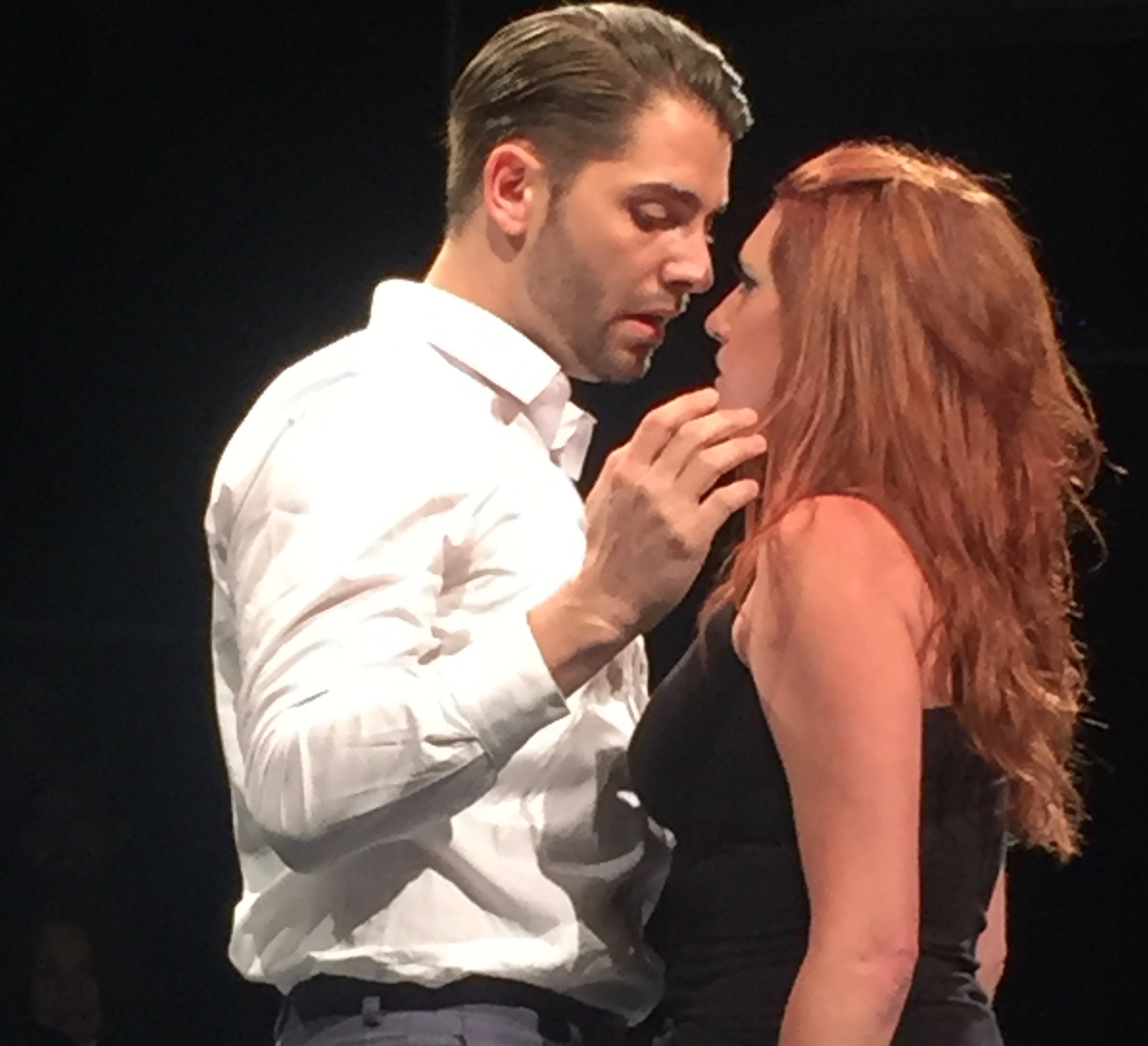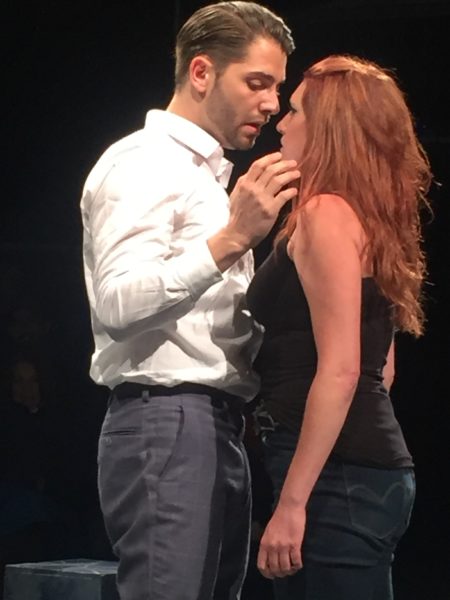
16 Jul Telluride Theatre: “The Taming of the Shrew,” A Review
Telluride Theatre presents “The Taming of the Shrew,” the 2017 Shakespeare in the Park production. The play runs, rain or shine, from Saturday, July 15 – Saturday, July 22. Shows are 8 p.m. nightly – except Sunday, July 16, which is a 2 p.m. matinee. There is no show on Wednesday, July 19. The production is suitable for young people 12+. Please dress warmly. It gets cold after dark on the stage. Tickets are $20 for adults; $12 for children and available here or by calling 970-708-7629.
The beat – and the beatings? – go on.
When the future leader of the free world can brag about a power grab of a very particular nature, a pox on anyone offended by the aggressive antics of a wife hunter who has just become wealthy and must, according to Elizabethan convention, marry someone of his class and position.
Meet Petruchio, a man of passion and vigor, chasing a skirt for a dowery. He gets way more than he bargains for in Telluride Theatre’s round, firm, fully packed adaptation of “The Taming of the Shrew,” a radiant production which warmed up the crowd on a cold, wet opening night.

Colin Sullivan is executive director of Telluride Theatre. He directed “The Taming of the Shrew.”
Because Colin Sullivan is a Shakespearian scholar, his production is crammed with the Bard’s wonderfully exuberant language, wacky characters, and plot twists. But it also brims with a sense of total abandon and profligate life.
The outlines of Telluride Theatre’s latest show suggest Colin saw the battle of wills between his leads – Michael Raver’s Petruchio and Cat Lee Covert’s Katherine – as an elaborate mating dance, so his “Shrew” boils with erotic energy that has something of a mythic quality about it: like we might be witnessing an orgy of reinvention and personal transformation.
When Cat delivers Kate’s notorious, enormously troubling speech at the tail end of the play in which she calls upon all women to honor their husbands as their kings and governors, there is a flash of irony in her shining eyes, a pride that calls into question her true intentions. And, as the happy couple heads off to bed, we are left with a hunch their relationship will continue to evolve. And that, in the long run, Kate will prove to be the stronger of the two. (Or am I projecting?)

Petruchio (Michael Raver) & Kate (Cat Lee Covert). Their chemistry is palpable.
Rather than the anti-“Romeo and Juliet,” Petruchio and Kate are more like the Vicomte de Valmont and the Marquise de Merteuil in Cholderlos de Laclos’ “Les Liaisons Dangereuses.” In other words, worthy adversaries — only a whole lot nicer.
With the full and enthusiastic complicity of his excellent creative team whose understated, less-is-more efforts let the story and characters rule the night – EK Bush, technical director and sets; Ursula Ostrander, stage manager/ production assistant; Colleen Thompson, makeup; Melissa Trn, costumes; and Tommy Wince, lighting – and a high-spirited, well-rehearsed cast, Colin Sullivan did a great job splicing together old and new theatrical styles, plus languages and characters to create a work that is at once wonderfully original and yet firmly rooted in its illustrious, if misogynistic past.
Written in the early 1590s, the truth is “Shrew” is emblematic of one of the most prevalent cultural conflicts of Shakespeare’s time: a patriarchal society whose laws and practices deprived women of any measure of equality or power. The “rightful order” of things was a hot topic in Elizabethan England, complete with prolific writings about the “proper” relationship between God and monarch, monarch and subject, country and citizen, parent and child, and of course husband and wife.
Hot topic.
Red hot property.
It is a measure of the Bard’s greatness that even a comedy as involved in gender politics and phallocentric supremacy as “Shrew” continues to be performed over 400 years later. In fact, the “problem” comedy is arguably the great granddad of the “battle of the sexes” story line, which continues to produce offspring. During the 17th and 18th centuries alone, there were no fewer than seven variations on the theme. In the 20th century, Cole Porter wrote “Kiss Me Kate” and Enrico Zeffirelli made a movie starring Richard Burton and Elizabeth Taylor as the warring duo. Contemporary films like “10 Things I Hate About You,” “The War of the Roses,” and “Mr. and Mrs. Smith” pledge allegiance too.
It is a measure of Colin’s intelligence and insight that he was able to see past the obvious sexual politics and put-downs, the hit-as-hit-can ethos, the pull of a feminist parable and mount (oops, poor choice of words?) such a shrewd adaptation of the comedy.
What is Colin’s “Shrew” ultimately about?
Set in modern-day Telluride – contemporary and local allusions inserted with great care and precision so as not to mess with the Bard’s meter or intent – the production, as suggested above, speaks to truly being yourself regardless of conventional “wisdom.” Its heroes, again Petruchio and Katherine, appear to cast convention and conformity aside and ultimately seem not to care a whit about what anyone thinks of them. (Perfect, because historically Telluride locals have extended a middle finger to form.)
Literally this “Shrew” tells the story of Baptista Minola, a beleaguered, wealthy patriarch of Telluride, the father of two daughters. He is played with elegant understatement by Telluride Theatre newbie Henry Mitchell, who is appropriately dignified and restrained – only occasionally exuberant – but always of regal demeanor despite conflicting emotions and conflicts around his girls.

Kate & Baptista (Henry Mitchell)
The youngest is the beautiful and talented Bianca. She is played by Chambri Swartz as a quietly vain and pampered purring kitten – but one with sharp claws that come out late in the evening. Bianca is being overly wooed by a trio of suitors.

Bianca (Chambri Swartz) & Kate
One of those suitors is Hortensio, whose stutter is a metaphor for always being just a beat behind. Clever device; convincing, often heartwarming performance by Peter Lundeen.

Hortensio (Peter Lundeen) & Gremio (Dave MacMillan)
David MacMillan is very funny as the creaking elder suitor Gremio, who like the Tin Man in the Wizard of Oz needs his joints – though not his lines – oiled. Gremio is a surrogate for “Pantalone,” a figure from the Italian commedia dell’arte of slapstick, improv theatre. Pantalone are stereotypes for old men, who are often punished and made into laughing stocks for chasing after sweet young things like Bianca. Poor old guy. Rich performance.
As Lucentio, Simon Perkovich appears perfectly cast as a naive, handsome, rich kid, who travels to Padua, sorry Telluride, to top off his education and see the world. His plans to study and make his dad proud fall by the wayside when he spots Bianca and falls hard.
Lucentio then appears to be very crafty, disguising himself as a tutor (Cambio) and gets into Baptista’s house where he has intimate access to his intended. Bianca and Lucentio eventually do fall in love and elope. Game over? Hold your horses folks: Bianca, in her own way, turns out to be a “shrew.”

Tranio (Caroline Grace Moore) & Lucentio (Simon Perkovich)
Caroline Grace Moore gives a solid (read believable), thoroughly engaging performance as Tranio, Lucentio’s trusty servant, playing it smart and loyal as opposed to all the other blundering servants in the mix.
Tranio gives Lucentio all kinds of good advice, like “forget studying. You should really meet some girls while you’re in (Padua) Telluride,” and suggests Lucentio impersonate a teacher so he can get close to Bianca, since Baptista will only let tutors into his home. Tranio then agrees to traipse around town pretending to be her charge. The only one who sees through the clever ruse is Petruchio – who teases, but never gives it away.
(Note: We have one regret about Tranio. The role does not call for Caroline to sing.)
All of Bianca’s suitors are frustrated though because Baptista has declared Bianca may not marry until Kate is wed.
Cat’s Kate appears dramatically in a form-fitting outfit that shows off her curves – then she releases her curve balls with a scalding, in-your-face bitchiness that enhances her sexiness, but in no way diminishes what’s under the surface: abiding intelligence. Cat gets Kate’s haughty act just right, which is to say, it is an act, a cover for deep frustration with her lot in life.
As Petruchio, Michael Raver, a (very sexy and talented) professional actor from New York, fills the stage every time he walks on, never missing a beat and giving a very physical performance as the wealthy bachelor and ultimate shrew-taming champion of the world. Even his eyebrows have a big personality. Smarmy and irresistible like most bad boy types – “You’re So Vain” – Petruchio’s greatest love is money. That is until he meets Kate.
Sue Knechtel as Grumio is an agile, riotous show-stealer, Petruchio’s ostensibly silly servant with a tendency to interpret all his master’s speeches and commands literally and in the most ridiculous ways imaginable. But Grumio is also astute, reminding the audience that Petruchio is not really a loon when he launches his shrew-taming reign of terror. Knechtel also plays the Widow, who marries – and dominates – Hortensio. Stitch to bitch.

Jane (Arabella Galbo) & Grumio (Sue Knecktel)
Lexie Torelli is riveting as Biondello, another of Lucentio’s servants. She is “Shrew’s” Puck, a tricky, double-talking hipster, whose natural grace and agility allows her to change on a dime like quicksilver: light as air one minute; slamming down on a cube like lead the next. Never obtrusive, but impossible to ignore, Torelli’s performance is the sleeper you won’t forget.
Buff Hooper opens “Shrew” as Christopher Sly, a drunk and beggar with an appetite for cheap beer and women. Buff is so convincing in the role that when he enters to trigger game on, a few people in the audience pulled back in their seats, thinking they were looking at the real deal, a sloppy interloper.

Drunk on the Floor (Buff Hooper), Park Rangers (Lexie Torelli & Evan MacMillan)
Sly is attracted to a male servant in a wig – a wonderfully camp Jaxon Mosher as Bartholomew, who later happily camps some more as the badly used tailor – misquotes famous lines from other Shakespearian plays and falls into a deep sleep during the performance of the five-act inset play staged to entertain the Lord, but supposedly staged for the tinker’s viewing pleasure. In other words, Sly is Shakespeare’s parody of the “groundlings” at the Globe, those who sat in the cheap seats, the butt of a practical joke.
Evan MacMillan is, among his other roles (almost all the supporting actors play multiple parts) hilarious as the Bible salesman from OMG, Utah, who gets recruited by Tranio to play Lucentio’s rich dad. Donning a wig and a slouch (to age), he is ridiculous and good ( or ridiculously good) in the part.
Arabella Galbo, daughter of choreographer Jessica and Rock ‘n Roll Academy’s Mark, is a promising young newcomer to Telluride Theatre’s Shakespeare in the Park. A beautiful young woman, she delivers her lines as an eager servant with grace and poise that belie her tender years. You go girl.
All in, Colin Sullivan’s “The Taming of the Shrew” is an accomplished adaptation of the tough and intense original, with few pretensions and no he-said, she-said agenda. It is good, slightly less than clean, theatrical fun. And, in the end, it appears to trust love.
The audience on opening night applauded loudly, many threatening to come back for a second helping.
Photo credits: Clint Viebrock for Telluride Inside… and Out.


Sorry, the comment form is closed at this time.